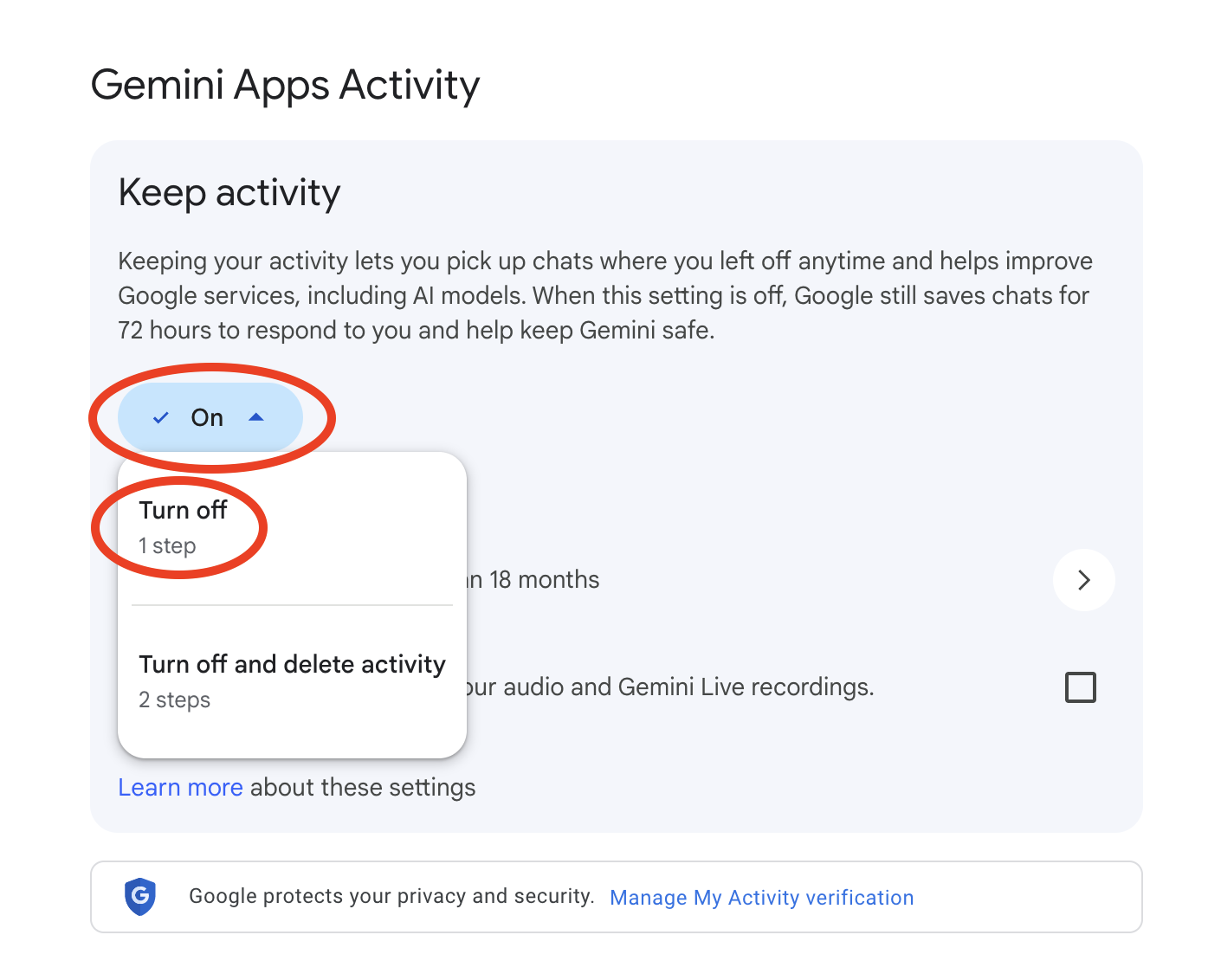Privacy, the Environment & Generative AI
GenAI tools are powerful—but they aren’t private by default, and heavy usage can be wasteful. This page shows how to protect personal/research data, set safer defaults in tools, and use GenAI more sustainably. If you get stuck, ask the instructor.
What you’ll learn
- What data GenAI tools may collect (chat, files/links, metadata) and how to limit it.
- How to redact Personally Identifying Information and sensitive info with reusable patterns.
- A quick tool-hygiene checklist (history, training, browsing, exports, deletion).
- File hygiene (metadata scrubbing for docs/images/audio).
- “Greener GenAI” habits that reduce waste.
Reminder: Follow your instructors guidelines for the assignment your are working on and UVic GenAI guidance before using GenAI on assessed work or research data.
What’s safe to paste? (fast classification)
| Category | Examples | OK to paste? | What to do |
|---|---|---|---|
| Public | Published article URL, press release | Yes | Cite source; still verify facts |
| Internal (non-sensitive) | Generic course info | Yes, with care | Avoid names/IDs; prefer paraphrase |
| Personally Identifying Information | Names, emails, student IDs, phone numbers | No (unless policy allows) | Redact using placeholders (below) |
| Sensitive | Grades, health, HR/legal, confidential grants | No | Use approved secure workflows only |
| Research data | Non-public data, interviews, raw datasets | No | Use policy-approved/secure tools only |
Redaction patterns you can reuse
Replace specifics with role-based placeholders before pasting:
- People:
Jane Smith→[Person_A](then[Person_B], …) - Email:
jane@uvic.ca→[Email_1] - Student ID:
V00xxxxxx→[ID_###] - Organization:
Company X→[Org_A] - Location:
Victoria, BC→[City_A] - Dates:
2025-11-09→[Date_2025-11-09](keep meaning, hide ID)
Keep a tiny “redaction rules” note so you can reverse-map if needed.
Privacy & data controls in tools
UVic-licensed Microsoft Copilot
- Sign in with your UVic account.
- Confirm you see the green “Protected” indicator at top right (UVic-licensed environment).
- Review data controls and browsing mode before pasting sensitive text.

ChatGPT (Data Controls)
- Open Settings → Data Controls.
- Turn off content used to improve models; review chat history settings.

Google Gemini (Privacy)
- Go to gemini.google.com.
- Click the Menu icon (three horizontal lines) in the top-left corner.
- Select Settings & help at the bottom of the sidebar.
- Click Activity (this will open the Gemini Apps Activity page).
- Find the Keep Activity toggle and click Turn off.
- You will be prompted with two choices:
- Turn off: Stops saving future chats for training.
- Turn off and delete activity: Stops future training and wipes your existing history.

If you want to keep your main history on but have a specific conversation that is private and not used for training, use the new Temporary Chat feature.
- Look for the model selector at the top of the chat (where it says “Gemini 3”).
- Click the dropdown and toggle on Temporary Chat.
Privacy Note: While in this mode, chats are deleted as soon as you close the window and are not used to train the model.

Policies and UI change over time. Confirm current settings each term and follow UVic policy.
Tool-hygiene checklist (do this every time)
- New chat per task (prevents cross-contamination).
- History/training: disable training on your content where possible.
- Sources: demand links and dates; forbid guessing (“If unsure, say NOT SURE.”).
- Exports: save what you need, then delete the conversation/file from the tool.
- Accounts: prefer educational or enterprise accounts for school work when permitted.
- Policy: when in doubt, don’t paste—summarize or use placeholders.
File hygiene (docs, images, audio)
- Docs (Word/PDF): Inspect/Remove personal info (author, path).
- Images: Strip EXIF (e.g., “Remove Properties”, or
exiftool -all= file.jpg). - Audio/video transcripts: Replace names with
[Speaker_A],[Speaker_B]. - Screenshots: Crop out IDs, emails, and unique codes.
- Keep originals offline when possible; paste only the minimum text needed.
Greener GenAI: use less, get more
- Use text & image generation tools over video generation when possible.
- Specify length (e.g., 120–150 words) and avoid repeated re-rolls.
- Use smaller models and avoid Deep Research tools for simple tasks.
- Batch questions into one structured prompt.
- Reuse verified snippets/templates instead of starting from scratch.
Hands-on drills (15–20 min)
A) Redaction drill (8–10 min)
Paste a paragraph with names, emails, and an ID (create one if needed).
Prompt:
Redact Personally Identifying Information with role-based placeholders before we continue.
People -> [Person_A], [Person_B]
Emails -> [Email_1], [Email_2]
IDs -> [ID_###]
Return a diff-style list of replacements only.
Acceptance: all identifiers replaced; meaning preserved.
B) Tool settings check (3–5 min)
Open your tool’s settings. Locate and toggle: history/training, browsing, data controls.
Acceptance: you can point to each setting and explain what it does.
C) Metadata clean (3–5 min)
Take an image or DOC/PDF and remove properties/EXIF.
Acceptance: properties pane shows blanks for author, GPS, device.
Badge evidence: screenshot of your redaction output and a settings screen.
Environment: why usage habits matter

- Large models consume significant energy for training and inference; researchers urge pragmatic steps to limit impact (Nature, 2024).
- Water use can rise for data-center cooling during model runs; several operators report increases while scaling AI (Nature, 2024).
- Groups suggest responsible development and comparative benefit–cost evaluation to guide sustainable practices (MIT Impact Climate, 2024; HBR, 2023).
Focus on right-sizing tasks (see “Greener GenAI” above) and choosing efficient options when you can.
Self-check (2 min)
- Did you classify data before pasting and redact Personally Identifying Information?
- Are tool history/training settings reviewed?
- Did you strip metadata from any files you shared?
- Did you keep the task text-first and length-bound?